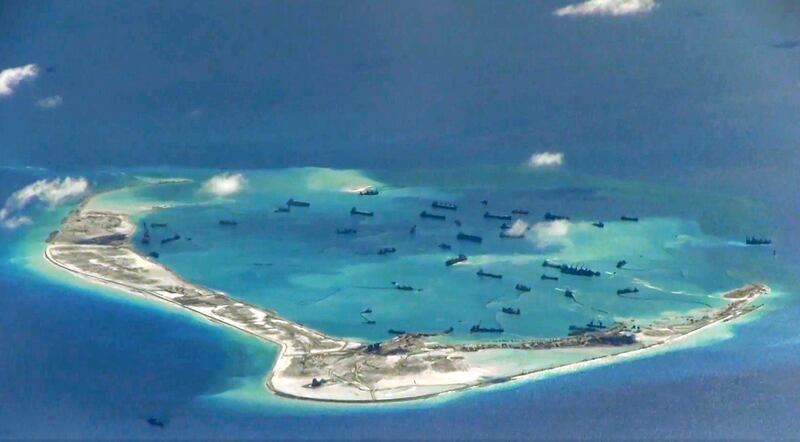The United States on Wednesday announced it had placed sanctions on 24 Chinese companies and individuals for their roles in constructing China’s artificial islands in the South China Sea.
The action is likely to exacerbate tensions between the two world powers. It follows the U.S. declaration last month that China’s claims to nearly all of the South China Sea on the basis of “historic rights” is unlawful. Washington has also accused Beijing of “bullying” other claimants.
“The United States, China’s neighbors, and the international community have rebuked the CCP’s sovereignty claims to the South China Sea and have condemned the building of artificial islands for the Chinese military,” Secretary of Commerce Wilbur Ross said in a statement, referring to the Chinese Communist Party.
“The entities designated today have played a significant role in China’s provocative construction of these artificial islands and must be held accountable,” Ross said.
The companies were placed on the U.S. Commerce Department’s Entity List, which restricts exports to businesses abroad because of their “activities contrary to the national security or foreign policy interests of the United States.” The placement effectively killing any ability for American businesses to trade or interact with them.
The State Department simultaneously placed visa restrictions on individuals within some of those companies, barring them from traveling to the U.S.
The stated reason for the sanctioning is the companies’ role in China’s extensive dredging campaign in the South China Sea from 2014 to 2017, which saw China build massive artificial islands and military bases among the Spratly and Paracel archipelagoes to strengthen its claim to disputed waters and support the activities of its military, the People’s Liberation Army.
China is holding military exercises around one of the features, Woody Island.
No immediate reaction
Beijing had no immediate reaction on Washington’s sanctions, which it often accuses of destabilizing the region through military and other activities.
The companies sanctioned include subsidiaries of China Communications Construction Co. (CCCC), a massive state-owned infrastructure-building conglomerate that U.S. Assistant Secretary of State David Stilwell called out by name last month for its role in dredging sand to build up China's outposts.
Secretary of State Michael Pompeo reiterated this charge in a statement announcing the sanctions on Wednesday, as well as accusing the People’s Republic of China, as the country is formally known, of destroying the marine environment in parts of the South China Sea in its base-building efforts.
“Since 2013, the PRC has used its state-owned enterprises to dredge and reclaim more than 3,000 acres on disputed features in the South China Sea, destabilizing the region, trampling on the sovereign rights of its neighbors, and causing untold environmental devastation,” he said.
”The PRC must not be allowed to use CCCC and other state-owned enterprises as weapons to impose an expansionist agenda. The United States will act until we see Beijing discontinue its coercive behavior in the South China Sea, and we will continue to stand with allies and partners in resisting this destabilizing activity.”
Other companies named are Shanghai Cable Offshore Engineering Co., and four subsidiaries of China Electronics Technology Group Corporation (CETC). The former installs submarine cables and other communications equipment between China's occupied features in the South China Sea.

CETC is a behemoth state-owned enterprise involved in telecommunications that frequently does work for the People's Liberation Army through its research arms, according to the Australian Strategic Policy Institute. For this reason, some of its subsidiaries and research institutes were already under sanctions.
The U.S. strongly suggested in the past that it was preparing sanctions on companies not named in this most recent list, such as the China National Offshore Oil Corp. (CNOOC).
Officials said CNOOC has played a direct role in pushing China’s claims in the South China Sea, most prominently by operating the Hai Yang Shi You 981 movable oil rig that kickstarted a standoff between Vietnam and China in 2014. However, this current list appears to be aimed only at companies involved in the construction of China’s bases in the South China Sea.
China’s sweeping claims in the South China Sea conflict with the maritime borders of six other Asian governments. A Permanent Court of Arbitration decided in 2016 that China’s claims held no basis under the United Nations Convention on the Law of the Sea (UNCLOS), and other countries such as the Philippines, Vietnam, India and Indonesia have urged China to adhere to that ruling.
At the 17th Viet-Nam India Joint Commission meeting on Tuesday, Vietnam and India both "underscored the importance of maintaining peace, stability, security, safety and freedom of navigation and aviation as well as peaceful settlement of disputes in the East Sea on the basis of international law, especially the 1982 United Nations Convention on the Law of the Sea (UNCLOS)."
They “called on parties to respect the rulings issued by the dispute settlement mechanisms under the UNCLOS,” alluding to the 2016 Permanent Court of Arbitration award. Vietnam refers to the South China Sea as the East Sea.
